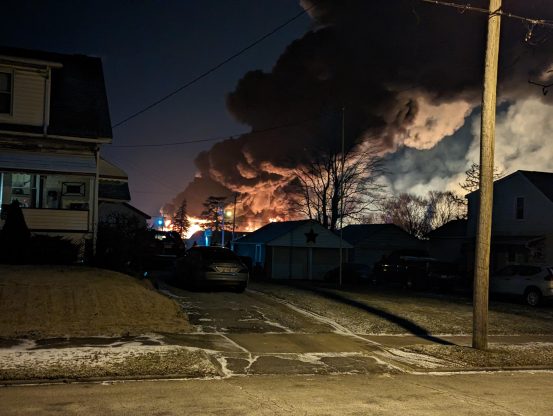
“Let’s put our heads together / And start a new country up / Up underneath the river bed / We’ll burn the river down”
– R.E.M., “Cuyahoga”
In the 1880s, my second great-grandparents settled in Cleveland, Ohio and built their house two miles from the banks of the Cuyahoga River. Like many Czech immigrants of their time, the Urban family came to the Industrial Midwest in hopes of finding work and land. They found that, but they couldn’t have anticipated the environmental toll of the work they came to find.
The Cuyahoga caught fire several times from pollution to the point they grew accustomed to it. Every few years, almost like clockwork, the Urbans of Cleveland watched the river burn.
More than a century later but less than 100 miles away, another river of Ohio is choking on the toxins and greed of industrial capitalism. East Palestine may be a small town with fewer than 5,000 residents, but it’s feeling the effects of industrial pollution as strongly as Cleveland ever did. The Feb. 3 derailment of a Norfolk Southern freight train, with 38 derailed cars and accompanying fire, was a disaster in itself. Local authorities’ decision to burn a few of the cars — releasing deadly vinyl chloride into the atmosphere — is nothing short of a climate crisis, facilitated by capitalist greed and governmental stupidity.
This sort of environmental disaster is the sort of thing Americans are used to under the ravages of capitalism. Pete Buttigieg, formerly of the extraordinarily corrupt consulting firm McKinsey — and alarmingly also the United States’ Transportation Secretary — nonchalantly said that the U.S. has roughly 1,000 train derailments a year.
The Environmental Protection Agency (EPA), whose 1970 founding was partly a response to the Cuyahoga burning, has detected contaminants in the nearby Ohio River. Cincinnati water authorities are monitoring the river as the Feb. 3 chemical spill approaches its shores. While the Ohio EPA has detected no vinyl chloride in the water so far, the bordering Northern Kentucky Water District is shutting down its Ohio River intake in cooperation with Cincinnati.
So local water authorities in Ohio and Kentucky are keeping a close watch on river pollution. This in itself is a good thing; the Ohio EPA even says that East Palestine’s municipal water supply is safe to drink (although private wells have yet to be tested). Regional powers seem to be performing dutifully. Yet, that’s clearly not good enough.
Senator Sherrod Brown says that East Palestine residents are “right to be skeptical” of their safety upon returning home after mass evacuations. Brown points out that Norfolk Southern’s mass layoffs and neglect of safety regulations is a classic representation of corporate greed. These are noteworthy words from a senior U.S. senator whose city of residence used to have its river catch fire every few years.
Norfolk Southern has much to account for. East Palestine residents say they’re experiencing headaches and eye irritation, possibly due to chemical pollution. Norfolk Southern CEO Alan Shaw flaked at a public safety meeting before making a half-hearted visit to East Palestine. A town with thousands of dead fish, choked by pollution, deserves answers.
The answers are not merely local. No crisis exists in a vacuum. The Trump-era Department of Transportation’s policies on braking, which relaxed safety regulations, led to the mass derailment. But more pertinently, the Biden administration has not counteracted the policy decision.
We must think broadly, or the Urbans’ visions of a burning Cuyahoga will be inevitable in the future.












